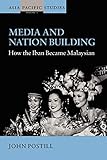Media and Nation Building : How the Iban became Malaysian / John Postill.
Material type: TextSeries: Asia-Pacific Studies: Past and Present ; 1Publisher: New York ; Oxford : Berghahn Books, [2006]Copyright date: ©2006Description: 1 online resource (248 p.)Content type:
TextSeries: Asia-Pacific Studies: Past and Present ; 1Publisher: New York ; Oxford : Berghahn Books, [2006]Copyright date: ©2006Description: 1 online resource (248 p.)Content type: - 9781845451356
- 9780857456878
- 302.23 22
- P95.82.M4 P67 2008
- online - DeGruyter
| Item type | Current library | Call number | URL | Status | Notes | Barcode | |
|---|---|---|---|---|---|---|---|
 eBook
eBook
|
Biblioteca "Angelicum" Pont. Univ. S.Tommaso d'Aquino Nuvola online | online - DeGruyter (Browse shelf(Opens below)) | Online access | Not for loan (Accesso limitato) | Accesso per gli utenti autorizzati / Access for authorized users | (dgr)9780857456878 |
Browsing Biblioteca "Angelicum" Pont. Univ. S.Tommaso d'Aquino shelves, Shelving location: Nuvola online Close shelf browser (Hides shelf browser)

|

|

|

|

|

|

|
||
| online - DeGruyter Experiencing Wages : Social and Cultural Aspects of Wage Forms in Europe since 1500 / | online - DeGruyter Between Marx and Coca-Cola : Youth Cultures in Changing European Societies, 1960-1980 / | online - DeGruyter Kinship in Europe : Approaches to Long-Term Development (1300-1900) / | online - DeGruyter Media and Nation Building : How the Iban became Malaysian / | online - DeGruyter Applications of Anthropology : Professional Anthropology in the Twenty-first Century / | online - DeGruyter Identity Matters : Ethnic and Sectarian Conflict / | online - DeGruyter The New Face of Political Cinema : Commitment in French Film since 1995 / |
Frontmatter -- CONTENTS -- List of Figures -- List of Tables and Appendixes -- Acknowledgements -- 1. Introduction: Media Anthropology in a World of States -- 2. What Became of the Iban? -- 3. Propagating the State, Phase I -- 4. Propagating the State, Phase II -- 5. Sustainable Propaganda -- 6. Writing Media -- 7. Media Exchanges -- 8. Clock Time -- 9. Calendar Time -- 10. Conclusion -- References -- Index
restricted access online access with authorization star
http://purl.org/coar/access_right/c_16ec
With the end of the Cold War and the proliferation of civil wars and "regime changes," the question of nation building has acquired great practical and theoretical urgency. From Eastern Europe to East Timor, Afghanistan and recently Iraq, the United States and its allies have often been accused of shirking their nation-building responsibilities as their attention — and that of the media -- turned to yet another regional crisis. While much has been written about the growing influence of television and the Internet on modern warfare, little is known about the relationship between media and nation building. This book explores, for the first time, this relationship by means of a paradigmatic case of successful nation building: Malaysia. Based on extended fieldwork and historical research, the author follows the diffusion, adoption, and social uses of media among the Iban of Sarawak, in Malaysian Borneo and demonstrates the wide-ranging process of nation building that has accompanied the Iban adoption of radio, clocks, print media, and television. In less than four decades, Iban longhouses ('villages under one roof') have become media organizations shaped by the official ideology of Malaysia, a country hastily formed in 1963 by conjoining four disparate territories.
Mode of access: Internet via World Wide Web.
In English.
Description based on online resource; title from PDF title page (publisher's Web site, viewed 25. Jun 2024)


